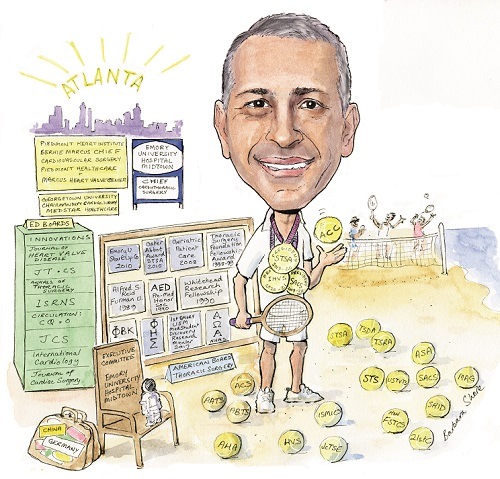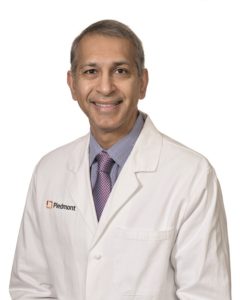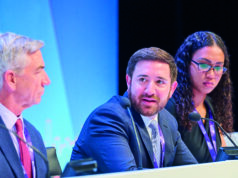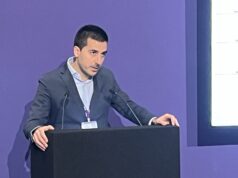
Mitral and tricuspid valve technologies, aortic valve replacement, and the value of the heart team are among the issues that Vinod Thourani (Marcus Valve Center, Piedmont Heart Institute, Atlanta, USA) tackles, as he reflects on his career for Cardiovascular News and addresses key areas for future research.
Why did you decide to become a doctor, and why did you choose to specialise in interventional cardiology?
My father was a non-invasive cardiologist in a small town in rural South Carolina for more than 30 years, so my interest in the heart started when I was about 10 years of age; I would shadow my dad in his office and the local hospital, and observe him during his clinics, on rounds in the hospital, performing electrocardiograms (ECGs) in the office, and performing cardiac echocardiograms. I remember thumbing through his textbook The Heart by J Willlis Hurst, at that time. This led me to become interested in cardiology.
I went to Emory University School of Medicine (where Hurst was based) for that reason in 1990. After gross anatomy in my first year of medical school, I then switched from cardiology to cardiac surgery. My interest in transcatheter or percutaneous valve technology developed during my 11 years of residency. I wanted to be able to provide a patient with the option of open, minimally invasive, or transcatheter aortic and mitral valve therapies. This would allow me to have the most equipoise in my approach to the management of these complex patients. In addition, when I started my practice in 2005, there were very few surgeons in the country who specialised specifically in valvular heart disease.
Who were the biggest influences on your early career?
My dad was a major influence, allowing me to pursue cardiovascular medicine. In medical school, David V Feliciano, a well-known trauma surgeon, was my earliest clinical mentor. He instilled in me the pursuit of comprehensive patient care, from preoperative management, operational efficiency, to attentive postoperative care. He also had a superb command of anatomy and an attention to detail that I still attempt to emulate to this day. Moreover, Feliciano instilled in me the importance of the highest ethical levels of performing clinical research.
I have been fortunate that I have had phenomenal, equally important, cardiac surgical and cardiology mentors. Robert Guyton, whom I first met as a second year medical student at Emory University, was instrumental in my development as a clinical cardiac surgeon, and led my pursuit in academic affairs. During my 15 years of practice, Michael Mack, a surgeon from Dallas, Texas, and Joseph E Bavaria, from the University of Pennsylvania, have been my confidants and mentors in the art of medicine and surgery, and in my continued research endeavours. It would be remiss not to mention Martin Leon, an interventional cardiologist from Columbia University, who has mentored me in my continued pursuit for research excellence. He has encouraged me to aim high in terms of what we can do as clinicians, particularly in research. His level of acumen and persistence for the highest level of investigation in the performance of sophisticated research trials remains one of my academic goals.
What has been the most important development in interventional cardiology during your career?
Without a doubt, it is the management of severe, symptomatic aortic stenosis with the advent of transcatheter aortic valve implantation (TAVI). I performed my first TAVI in 2006 with the team at Emory University, including interventional cardiologists Vasilis Babaliaros and Peter Block, and cardiac surgeon Robert Guyton. The technology was in its infancy then, but it has now become one of the most disruptive technologies of our time. It has allowed us to advance the treatment of aortic stenosis to multitudes of patients that had no other option.

What are your current research interests?
I am interested in continuing the pursuit for new TAVI technologies, but also in innovating pathways for mitral and tricuspid valve technologies. I was fortunate to come back to Atlanta in October 2019. With our current team at the Marcus Valve Center in the Piedmont Heart Institute in Atlanta, Georgia—interventionalists Chris Meduri, Vivek Rajagopal, and Pradeep Yadav, and surgeons W Morris Brown, James Kauten, and Federico Milla—I believe we are well on our way to making major advancements in these technologies. Furthermore, our echocardiography and computed tomography imaging team is world class, including Mani Vannan, Sara Mobasseri, and Venkat Polsani among others. I am very honoured to be part of this incredible and world-class team.
I am spending an enormous time on the study of new devices in the mitral and tricuspid valve space, which may include transcatheter and minimally invasive techniques. I also continue to focus on decreasing morbidities in TAVI and surgical aortic valve replacement procedures.
What do you feel has been your biggest contribution to interventional cardiology?
My biggest contribution is that we have proven that surgeons and cardiologists can work seamlessly together as a heart team: that barriers that once existed can be torn down to lead to a team collaboration that produces exemplary care for patients. We have to be careful not to get lost in the technology, but to ensure that we concentrate on the highest level for quality patient care that we can provide. This can be on a local level at the hospital, but also on a national level with our respective societies like the American College of Cardiology (ACC), American Heart Association (AHA), Society of Thoracic Surgeons (STS), and the American Association for Thoracic Surgery (AATS).
What are the key unanswered questions that future research should prioritise?
In the management of aortic valve disease (both aortic stenosis and regurgitation), I believe that we still are unsure how to predict who will or will not do well. The idea of utility and futility needs some more precision. Also, the area of treatment of moderate aortic stenosis. In the mitral and tricuspid space, I believe we have much more to learn about which is the optimal therapy. The complexity and toolbox needed for the management of these valves is highly complex, and I believe we are just scratching the surface for those patients. Lastly, future research on the untreated population of valvular surgery is in its infancy and will be important to ascertain.
Now that TAVI can be used for low-risk patients, what factors should be considered when deciding between TAVI and surgery?
I think anatomical considerations are very important. In the low-risk trials there were certain patient populations that were excluded, including those who were very young (and may need a mechanical valve), those with bicuspid aortic valves, and those with severe left ventricular outflow calcium, to name a few. I think one of the most important is that it should be a heart team decision that is presented to the patient.
What impact has the COVID-19 pandemic had on your practice?
The pandemic has had a major effect on our personal and professional lives. While I am profoundly saddened by the countless of deaths, it has allowed me to appreciate my close friends and family even more. It is quite ironic that it takes a pandemic for us to slow down and smell the roses. I have been keeping up with my patients who are still of need of heart surgery and will continue to advocate the right time for their interventions.
What are the implications of COVID-19 for the management of patients with structural heart disease?
The pandemic has definitely affected those with structural heart disease. With most of the country not performing elective procedures for the past four to six weeks [at time of writing], that has left many patients at home with severe valvular disease and the resultant shortness of breath. This has been in response of the need to protect these patients from coming to the hospital for the risk of infection, but also to allow enough personal protection equipment for those infected with the virus admitted in the hospital.
What are your hobbies and interests outside of medicine?
I love spending time with my family, playing tennis, watching moves, and anything to do with the beach [pre social distancing]. I also love to travel internationally to experience different cultures and point-of-views, it allows me to think out of the box.
Factfile
Current appointment
- October 2019–present: Bernie Marcus chair of the Department of Cardiovascular Surgery, Piedmont Healthcare and the Marcus Heart Valve Center, Atlanta, USA
Past appointments
- August 2017–October 2019: Chairman, Department of Cardiac Surgery, MedStar Health (Washington Hospital Center and Union Memorial Baltimore Hospital Programs), Washington, DC and Baltimore, USA; Professor of Surgery, Georgetown University School of Medicine, Washington, DC, USA
- August 2017–October 2019: Executive Committee, MedStar Heart and Vascular Institute, Washington, DC, USA
- August 2017–October 2019: Medial Board and Perioperative Goverance Council, MedStar Washington Hospital Center, Washington, DC, USA
- 2005–2017: Assistant, Associate, and then Professor of Surgery and Medicine, Emory University School of Medicine, Atlanta, USA
Selected postgraduate training
- 2006 (two months): Transcatheter and Minimally Invasive Valve Fellowship, Fuwai Hospital, Beijing, China and Leipzig Heart Center, Leipzig, Germany
- March 2003 (two weeks): Visiting cardiothoracic surgery fellow, Brigham and Women’s Hospital, Harvard Medical School, Boston, USA
- March 2003 (two weeks): Visiting cardiothoracic surgery fellow, Toronto General Hospital, Toronto, Canada
- 2004–2005: Administrative chief resident, Cardiothoracic Surgery, Emory University School of Medicine, Atlanta, USA
- 2002–2004: Resident in Cardiothoracic Surgery, Emory University School of Medicine, Atlanta, USA
Medical education
- 1990–1994: Doctor of Medicine, Emory University School of Medicine, Atlanta, USA
- 1986–1990: Bachelor of Science (Biology), Furman University, Greenville, USA
- Selected societies
- 2019–2020: President, Southern Thoracic Surgical Association
- 2020–2021: President, Heart Valve Society













